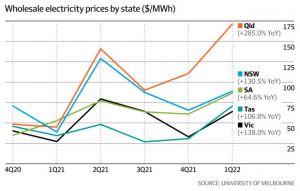An expert has warned Australian consumers to brace for energy bill shock this winter due to rising wholesale electricity prices as demand for coal surges.
The first quarter of 2022 saw wholesale costs soar by more than 100 per cent compared to the same period last year, according to Dylan McConnell, research fellow at the University of Melbourne’s climate and energy college.
“The impact on household bills is not going to be immediate, most likely within months,” he told the Australian Financial Review.
“It will depend on how retailers are hedged too. Those which are not hedged as well will move more rapidly to pass the increases onto the consumer.”
Mr McConnell’s analysis uncovers a price spike of more than $100 per megawatt hour (MWh) this quarter, an annual rise between 64.6 and 284 per cent depending on location. And his research shows Queensland bill-payers will likely be hit the hardest.

“Futures prices for the next quarter are looking pretty nasty as well. The whole forward curve isn’t looking that great and Queensland and NSW Q2 2022 prices went up $30MWh and $20/MWh respectively on Friday alone,” said Mr McConnell.
A surge in coal prices is largely to blame as the fossil fuel remains the primary source of electricity generation across the National Electricity Market (NEM). The NEM is Australia’s largest wholesale market where power generators and retailers trade electricity for supply in the six eastern and southern states and territories.
Recent unfavourable weather has also put more demand on grids, while the effects of a global pandemic has worsened conditions. This is on top of gas price hikes and shortages following the Russian invasion of Ukraine, as well as an outage at Queensland’s Callide Power Station last year.
As the cost of living continues to increase, Australia’s energy future will remain a fiery talking point among lobbyists and politicians.
It comes after tech billionaire Mike Cannon-Brookes made an audacious bid to acquire energy giant AGL, promising a quicker phaseout of coal-fired power and more investment into renewables.
How does the wholesale market impact electricity bills?
Wholesale energy prices are the market rate that retailers pay for electricity before they place on their margins and pass onto paying customers, Canstar Blue’s Energy Editor, Jared Mullane, explained.
“Energy retailers are now feeling the shock of increased wholesale prices and the medium to long-term forecast is that we’re entering a period of consistently higher wholesale costs,” he said.
“Wholesale prices are likely to continue rising in the next few months, and it’s going to have a noticeable effect on price competition because it’s not going to be sustainable to compete in these sorts of conditions for some retailers. There is also uncertainty as to whether these wholesale prices are the new normal, as the pricing market the last couple of years has been so low.”
Mr Mullane refers to favourable wholesale conditions that have benefitted from an uptake of renewable generation entering the grid, predominately rooftop solar. In recent years, this boosted supply of energy has helped decrease costs for consumers.
Retail energy bills consist of four main costs for supplying power – network service charges, retailer margins, wholesale prices and environmental obligations. According to the Australian Energy Regulator (AER), wholesale costs make up about one third of electricity bills.
Is now the time to fix electricity rates?
With household energy use and electricity prices expected to rise come winter, there are ways for customers to reduce the likelihood of bill shock. One easy way to ensure there are no sneaky price hikes within a contract period, is to switch to a plan with fixed rates, Mr Mullane said.
“Winter is right around the corner and many Australians are going to be using more power to heat their homes, especially in the southern states. As wholesale prices continue to climb, retailers will likely be put in a position where it’s only viable from a business perspective to increase rates for their customers.
“To help mitigate rising retail energy prices, residents can choose to lock in their electricity rates on certain plans offered by a handful of providers. Keep in mind these plans usually only fix rates for 12 or 24 months, however it means there’ll be no price hikes during this period, which can provide bill-payers with a degree of comfort.”
Some retailers that currently offer fixed rates include EnergyAustralia, Nectr, Origin and Tango Energy.
Compare Energy Plans
Here are some of the cheapest published deals from the retailers on our database that include a link to the retailer’s website for further details. These are products from referral partners†. These costs are based on the Ausgrid network in Sydney but prices may vary depending on your circumstances. This comparison assumes general energy usage of 3900kWh/year for a residential customer on a single rate tariff. Please use our comparison tool for a specific comparison in your area. Our database may not cover all deals in your area. As always, check all details of any plan directly with the retailer before making a purchase decision.
Here are some of the cheapest published deals from the retailers on our database that include a link to the retailer’s website for further details. These are products from referral partners†. These costs are based on the Citipower network in Melbourne but prices may vary depending on your circumstances. This comparison assumes general energy usage of 4000kWh/year for a residential customer on a single rate tariff. Please use our comparison tool for a specific comparison in your area. Our database may not cover all deals in your area. As always, check all details of any plan directly with the retailer before making a purchase decision.
Here are some of the cheapest published deals from the retailers on our database that include a link to the retailer’s website for further details. These are products from referral partners†. These costs are based on the Energex network in Brisbane but prices may vary depending on your circumstances. This comparison assumes general energy usage of 4600kWh/year for a residential customer on a single rate tariff. Please use our comparison tool for a specific comparison in your area. Our database may not cover all deals in your area. As always, check all details of any plan directly with the retailer before making a purchase decision.
Here are some of the cheapest published deals from the retailers on our database that include a link to the retailer’s website for further details. These are products from referral partners†. These costs are based on the SA Power network in Adelaide but prices may vary depending on your circumstances. This comparison assumes general energy usage of 4000kWh/year for a residential customer on a single rate tariff. Please use our comparison tool for a specific comparison in your area. Our database may not cover all deals in your area. As always, check all details of any plan directly with the retailer before making a purchase decision.
Image credit: ice_blue/Shutterstock.com, University of Melbourne


Share this article